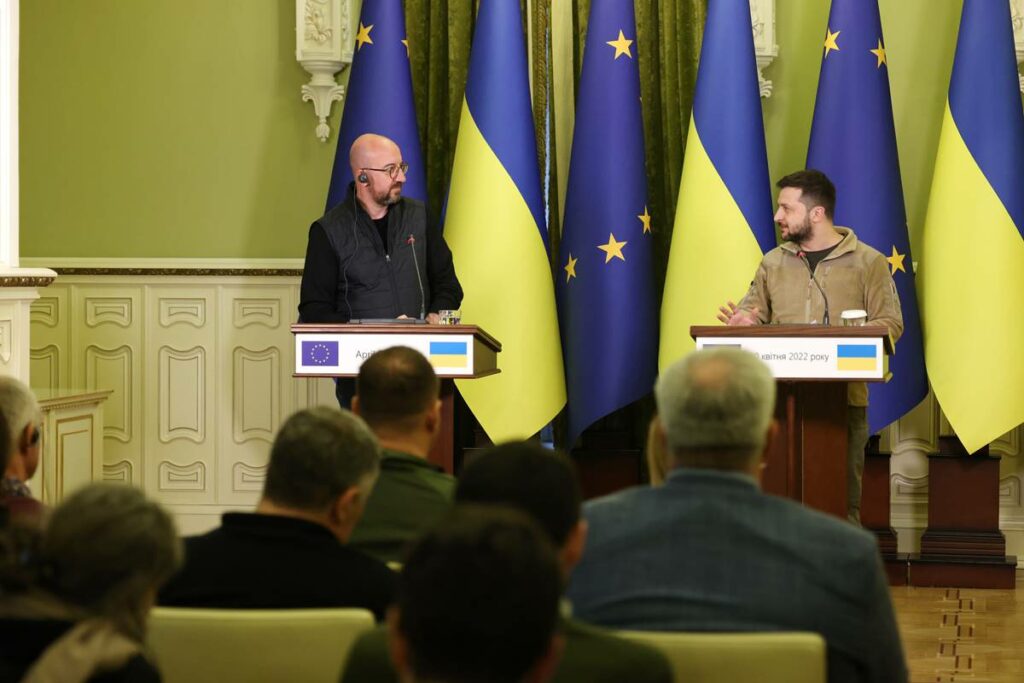A Eurobarometer survey in all member states published on Thursday shows large support among EU citizens for the EU's response to Russia's invasion of Ukraine but also significant differences among the respondents by country on reducing EU’s dependency on import of fossil fuels from Russia.
The Flash Eurobarometer survey was conducted in the 27 member states between 13 and 20 April 2022, during the second month of the war. Over 26,000 EU citizens were interviewed online.
A major finding is that the war in Ukraine concerns EU citizens. They tend to closely follow the news related to the war and frequently discuss it with their friends and relatives. A majority in all EU member states follow the news at least once a day. More than two-thirds of respondents are personally worried about the war in Ukraine.
Respondents are most likely to trust European and national authorities as a source of information about the war. More than half of respondents also trust journalists and NGOs as a source of information about the war in Ukraine.
Trust in social media – where conspiracy theories and fake news flourish - as a source of information about the war is much lower, with the lowest figures in Belgium and France (both 21%), and Italy and Slovakia (both 22%).
Overall, the survey shows large consensus among EU citizens in all member states in favour of the EU’s response to Russia’s invasion of Ukraine. The majority of Europeans think that since the war started, the EU has shown solidarity (79%) and has been united (63%) and fast (58%) in its reaction.
Respondents are also widely in favour of the EU support to Ukraine and its people. In particular, more 93% approve providing humanitarian support to the people affected by the war. 88% of Europeans approve the idea of welcoming in the EU people fleeing the war. 80% approve the financial support provided to Ukraine.
Satisfaction with the reaction of the EU to the war ranges from 29% in Greece, 32% in Bulgaria and 33% in Cyprus, to 63% in Romania, 65% in Finland and 67% in Denmark. Satisfaction with other authorities and countries (the US, UN and NATO) shows a similar country pattern. Satisfaction with how the United Nations (UN) reacted is overall the lowest (40%).
Support for Ukraine joining the EU
The proportion agreeing that they feel sympathy towards Ukrainians is above seven in ten in all countries, ranging from 72% in Bulgaria, 77% in Hungary and 80% in Slovakia, to 94% in Finland, Ireland, Lithuania, Portugal and Sweden, and 96% in Malta.
An overwhelming majority of respondents either totally (52%) or tend to agree (26%) that Russia is responsible for the current situation. Bulgaria and Cyprus are the only two countries where a (relative) majority disagree that Russa is responsible for the war (46% and 52%, respectively).
Overall, 71% believe that Ukraine is part of the European family and 89% feel sympathy towards Ukrainians. Importantly, in view of Ukraine’s application for EU membership, 66% agree that ‘Ukraine should join the EU when it is ready’ but the figures vary significantly by country.
The largest share of respondents in favour of Ukraine joining the EU is observed in Portugal (87%), followed by Estonia (83%), Lithuania (82%) and Poland (81%). The largest proportions disagreeing that Ukraine should join the EU when it is ready are found in Luxembourg (38%), Greece (37%), Hungary (36%), Austria and Bulgaria (both 35%), and Cyprus and Slovakia (both 34%).
Support for the sanctions imposed on Russia is also very high. 80% of those consulted approve the economic sanctions against Russia and 79% approve sanctions against Russian oligarchs. Furthermore, 67% approve that the EU finances the purchase and supply of military equipment to Ukraine and 75% consider that the war in Ukraine shows ‘we need greater military cooperation within the EU'.
Divided on energy dependency on Russia
Support for the various EU measures aimed at securing energy supply and mitigating rising energy prices tends to be high across member states. More than three-quarters of respondents agree in all member states that the EU should take measures to increase energy efficiency of buildings, transport, and goods – the share agreeing with this ranges from 76% in Slovakia to 98% in Portugal.
Respondents from different countries are somewhat more divided about measures to reduce the EU’s dependency on Russian gas and oil as soon as possible, reflecting their dependence on Russia. This makes it difficult for EU to agree unanimously on sanctions against the import of fossil fuels from Russia.
In Slovakia, 59% of respondents agree these measures should be taken, compared to 96% in Portugal. Apart from in Slovakia, relatively few respondents support measures to reduce the EU’s dependency on Russian gas and oil as soon as possible in Bulgaria (63%), Hungary (67%) and Cyprus (69%).
The great majority of respondents are prepared to take at least some actions to cut down on their energy consumption and bills. However, fewer respondents are prepared to take some of the more costly actions with a higher impact on personal life.
Among a relative majority of respondents, the EU’s response to the war in Ukraine has not led to an increase in identification with Europe: 25% tend to disagree and 21% totally disagree that they feel more European since the war in Ukraine started, compared to 13% who totally agree and 30% who tend to agree.
The Brussels Times

